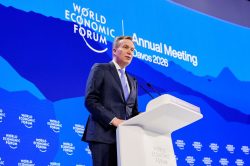
Cars and trucks drive on a highway in Frankfurt, Germany, Jan. 27, 2023.
11:23 JST, February 4, 2023
BRUSSELS (AP) — U.S. Treasury Secretary Janet Yellen said Friday that industrialized countries in the Group of Seven are imposing a price cap on refined Russian oil products such as diesel and kerosene, as part of a coalition that includes Australia and a tentative agreement from the European Union.
The cap follows similar price limits put on Russian oil exports, with the goal of reducing the financial resources Russian President Vladimir Putin has to wage the nearly year-long war in Ukraine.
“Today’s agreement builds on the price cap on Russian crude oil exports that we set in December and helps advance our goals of limiting Russia’s key revenue generator in funding its illegal war while promoting stable global energy markets,” Yellen said in a statement.
On Friday, EU governments tentatively agreed to set a $100-per-barrel price cap on sales of Russian diesel to coincide with an EU embargo on the fuel. Diplomats representing the 27 EU governments set the cap on Russian diesel fuel, jet fuel and gasoline ahead of a ban taking effect Sunday. It aims to reduce Russia’s income while keeping its diesel flowing to non-Western countries to avoid a global shortage that would send prices and inflation higher.
Details about the cap were provided by a G-7 statement and diplomats from three different EU member nations, who agreed to discuss the cap on the condition of anonymity.
The $100-per-barrel cap applies to Russian diesel and other fuels that sell for more than the crude oil used to make them. Officials agreed on a $45-per-barrel limit on Russian oil products that sell for less than the price of crude.
The deal follows a similar G-7 agreement to limit the price of Russian crude oil to $60 a barrel. All the price ceilings are enforced by a requirement for the world’s largely Western-based shippers and insurers to abide by sanctions and handle oil products only priced at or below the limits.
Russia has said it will not sell to countries obeying the oil cap, but because its oil is selling for less than $60 per barrel, it has kept flowing to the global market. The price caps encourage non-Western customers that have not banned Russian oil to press for discounts, while outright evasion — though possible — carries additional costs such as organizing off-the-books tankers.
The ambassadors of the 27 EU nations put forward the decision, and national governments have until early Saturday to react with a written objection. No changes to the deal were expected.
Europe has been steadily reducing its diesel supplies from Russia from around half of all imports. Diesel is key for the economy because it is used to power cars, trucks carrying goods, farm equipment and factory machinery. Prices have spiked since Russia invaded Ukraine on rebounding demand and limited refinery capacity in some places.
If the price cap works as intended and Russian diesel keeps flowing, fuel prices should not skyrocket, analysts say. Europe could get alternate supplies of diesel from the U.S., India and the Middle East, while Russia could seek new customers outside Europe.
However, the impact of the cap will be unpredictable as shippers reroute flows of the fuel to new destinations, and longer sea journeys could strain tanker capacity.
Fossil fuel sales are a key pillar of Russia’s budget, but European governments previously hesitated to cut off their purchases because the economy was heavily dependent on Russian natural gas, oil and diesel. Since the start of the war in Ukraine, that has changed.
Europe cut off Russian coal and later banned its crude oil on Dec. 5. Meanwhile, Moscow has halted most supplies of natural gas to Europe, citing technical issues and a refusal by customers to pay in Russian currency. European officials say it is retaliation for sanctions and an attempt to undermine their support for Ukraine.
Top Articles in News Services
-

Survey Shows False Election Info Perceived as True
-

Hong Kong Ex-Publisher Jimmy Lai’s Sentence Raises International Outcry as China Defends It
-

Japan’s Nikkei Stock Average Touches 58,000 as Yen, Jgbs Rally on Election Fallout (UPDATE 1)
-

Japan’s Nikkei Stock Average Falls as US-Iran Tensions Unsettle Investors (UPDATE 1)
-

Trump Names Former Federal Reserve Governor Warsh as the Next Fed Chair, Replacing Powell
JN ACCESS RANKING
-

Producer Behind Pop Group XG Arrested for Cocaine Possession
-

Japan PM Takaichi’s Cabinet Resigns en Masse
-

Man Infected with Measles Reportedly Dined at Restaurant in Tokyo Station
-

Israeli Ambassador to Japan Speaks about Japan’s Role in the Reconstruction of Gaza
-

Videos Plagiarized, Reposted with False Subtitles Claiming ‘Ryukyu Belongs to China’; Anti-China False Information Also Posted in Japan

























